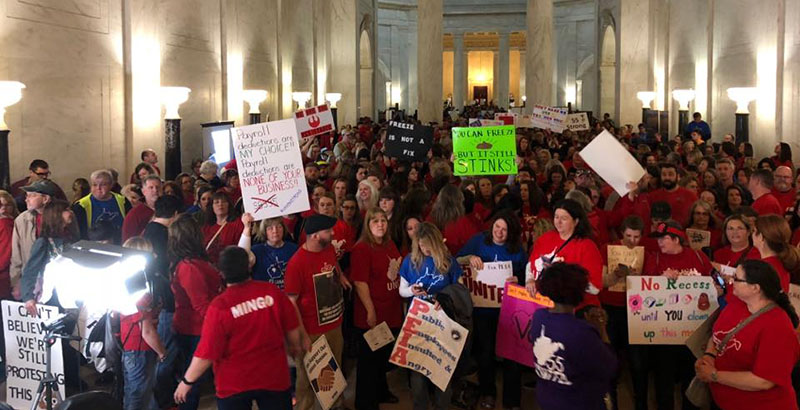Analysis — A Reality Check About the Education Labor Arms Race: Oklahoma & W. Virginia Are Not Game Changers. Neither Is Janus

Mike Antonucci’s Union Report appears Wednesdays; see the full archive
We tend to use military terminology to describe public policy conflicts, and that’s certainly the case with public education. There’s a “war on teachers” and a “war on unions” and a “war on taxpayers.” No one wants a war, but when you are in one you want to win.
What’s the best way to win a war?
There has been plenty of advice about that through the ages, from Sun Tzu to Norman Schwarzkopf. When it comes to education labor issues, both sides actually use the same tactic: go straight to the ultimate weapon and force the enemy into unconditional surrender.
Long drawn-out conflicts wear down all sides and are unsatisfying even when won. Better to end the war quickly and decisively by dropping the atomic bomb on our adversaries. Afterwards we can dictate terms.
School reformers and union opponents have tried any number of would-be ultimate weapons over the years — vouchers, charter schools, paycheck protection, et al. None of them achieved the goal of making teacher unions a non-factor in education, labor, or fiscal policy.
Teacher unions have their own arsenal — class size reduction, Proposition 98, the Every Student Succeeds Act, et al. None of them achieved the goal of making teacher unions the absolute factor in education, labor, or fiscal policy.
The latest ultimate weapon on the reform side is Janus v. AFSCME, the case before the U.S. Supreme Court that may end the practice of public employee unions charging agency fees to non-members. Commentators on both sides say the case could “cripple,” “destroy,” and “permanently weaken” teacher unions.
In the last month, we have experienced statewide teacher strikes in West Virginia, Oklahoma, and Kentucky — all states without agency fees, and without a majority of education employees who even belong to a union. I’ll wager few of those protesting know about the Janus case, or would care very much about it if they did know.
A Janus ruling will greatly change things for public employee unions. Their power will be altered, perhaps reduced significantly, but they won’t be crippled or destroyed. But twenty-eight states don’t allow agency fees and they all have teacher unions, some very powerful. Janus is no ultimate weapon.
What’s fascinating about the current situation is that labor advocates think they now have the ultimate weapon: large-scale strikes.
West Virginia public employees went on strike and got a 5 percent raise. Oklahoma teachers walked out after the legislature approved a 16 percent pay hike. Kentucky teachers are looking to reverse legislation that made major changes to the pension system. Arizona teachers could be next to strike. It’s not surprising that unions are seeing this as a mass movement to make their dreams come true.
I have to rain on their parade as well.
These new walkouts repeat the experience of West Virginia in that no one is losing pay for going on strike. This doesn’t diminish the actions of the protesters, but it makes their decision to strike a whole lot easier. Suppose school districts and the state stop paying up? How long will Oklahoma teachers stay out if they are sacrificing not only their regular pay, but the unprecedented wage increase that already has been signed into law?
It’s one thing for the public to support strikers who are making $35,000 a year. Will this wave carry over into Los Angeles and San Diego, where teachers can make $80,000-$90,000?
The unions have an internal problem to handle, too. West Virginia teachers continued their strike after union leaders cut a deal with the governor to end it. In Kentucky there is a lot of evidence that the union is following the crowd, rather than leading it. This may also be true in Oklahoma. If union officers can’t end a strike, why would those in power negotiate with them? This particular ultimate weapon might blow up in their faces as teachers find they can organize and advocate effectively without a union.
There’s an old military adage that “the enemy gets a vote.” In other words, your plan may appear flawless, but as long as there is someone working to foil it, you will have to adjust or come to ruin.
Unions will adjust tactics to counteract Janus. Districts and legislatures will adjust tactics to counteract strikes. It is the ebb and flow of the education labor arms race. Peace is not at hand.
Help fund stories like this. Donate now!

;)